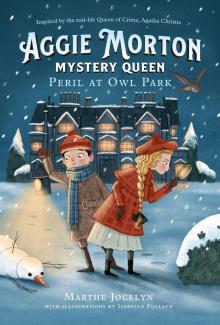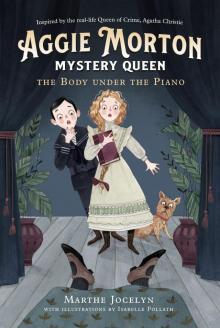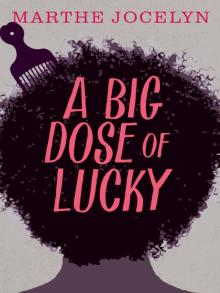- Home
- Marthe Jocelyn
Earthly Astonishments Page 2
Earthly Astonishments Read online
Page 2
Josephine had never needed money before now. She was fed—a little, and clothed—unless you looked close. So what did she need with money? But Old Betsey had been paid, Cook got wages, even Sylvester, she supposed, must receive a few pennies, since he kept coming back to plague them all. And Miss MacLaren had promised a wage to Josephine’s father that very first day at the Fair! So where was it? She’d have to ask for her pay!
She ignored the sign in the hall outside Miss MacLaren’s study:
ENTRY IS FORBIDDEN
TO THE STUDENTS
OF MACLAREN ACADEMY
A gas lamp burned on the wall by the door and another on the gracious writing desk. The walls had fancy paper on them, with a dark, rose-colored stripe. The whole room was pink and ghosty feeling. It was like being inside somebody’s stomach.
The headmistress sat hunched over her desk. By her feet was her prayer stool, its hinged lid open to expose a cedar-lined compartment. Miss MacLaren’s hands moved in the circle of lamplight, scratching numbers in a book. Josephine hesitated at the open door, her exhilaration dribbling away.
Miss MacLaren’s lips hung open slightly while she wrote. Josephine was reminded of the luncheon haddock when it was still whole, lying gape-mouthed on the chopping board. She realized with a jolt that stacked on Miss MacLaren’s desk, just beyond the circle of light, were little towers of coins. The haddock was counting her riches!
Josephine nearly stole away back to the kitchen, but a picture in her mind, of Cook wielding the ladle, forced her across the carpet. Miss MacLaren banged her book shut when she found a face peering up at her.
“Whatever do you mean, sneaking at me like that?” One hand pressed against her floral bodice, while the other promptly shielded her treasure from Josephine’s eyes.
“I didn’t mean to sneak. I’m quiet, is all.” The sound of her own husky voice surprised Josephine; she could go days at a time without speaking to anyone.
“Well? What can you possibly want?”
“I want … I want you, please, to pay me. It’s five gold dollars. You promised my pa when you took me in. One gold dollar for each year’s service, you said. Please.”
Miss MacLaren’s plump hand slid down from her bosom and smacked the surface of her desk, making a hollow thump. Her words came out like steam from between closed teeth.
“My arrangement with your parents is no business of yours. A creature like you is lucky to have a corner to sleep in and food each day. I’ll thank you to never again put me in the position of discussing money with a servant.”
She dipped her pen and returned to work, without blinking her stony eyes. Josephine’s ears stung, as if the unkind words had scalded them. Her feet stumbled over themselves, backing out of the room.
“Excuse me!” Miss MacLaren’s curt bark stopped Josephine in her tracks. “I have not dismissed you. For your impertinence, you will do some copying.”
Josephine tiptoed forward again to receive the pages thrust into her hands.
“Ten duplicates by morning. Take ink and pen from the drawer of the hall table. You may go.”
Josephine trudged back to the kitchen, trembling with anger at her own foolishness. She lit a candle and crouched on her mat, not daring to rest before she had copied the words:
I will behave myself wisely in a perfect way.
This much I can do for Teacher.
Morning came too soon for Josephine’s backside to have a chance at healing.
“What’s the trouble, Worm?” asked Sylvester, with a sly look. “Having trouble sitting down?”
“Keep out of my way, and I’ll keep out of yours,” threatened Josephine. “Otherways, I’ll make your eyes grow crossed.”
He shot her a look that told her he believed her. His hand flew to his face, as if to protect himself. Josephine laughed to herself all morning, watching him peel potatoes without glancing up. Meanwhile she stayed as far from Cook as she could manage and still complete her tasks. And tasks there were aplenty.
It was Parents’ Day. The front vestibule was festooned with flags and ribbons, welcoming families from all over New York City, as well as towns beyond its limits. Certain girls would return home next week, it being end-of-term, while others would remain as summer boarders.
Many parents arrived by horse cab, while some families, like Charlotte’s and Emmy’s, had splendid carriages of their own.
The Academy choir lined the walk, wearing their new summer boaters and singing, “Onward Christian Soldiers.”
Josephine spied through the cellar door onto the street, watching the ladies arrive in skirted coats, with gentlemen in silk top hats. They all paused to smile at the chorus of girls before entering the school and being directed toward the dining room.
Josephine wondered briefly where her own parents were today. Certainly not dressed in Sunday clothes, stepping lightly out of horse cabs. Not visiting their only daughter, bearing gifts of books and peppermints. Not thinking about her at all.
“Hey! Worm!” Sylvester yanked her from the doorway. “Time to serve the high and mighty!”
The kitchen had produced delicacies rarely tasted at MacLaren Academy. The traditional Parents’ Day luncheon was a roasted lamb with parslied potatoes and pitchers of gravy and whole gardens-full of green beans. Josephine wondered if the parents were hearing complaints of the usual fare or whether they believed their own bellies.
As luncheon was cleared away, parents were invited into the classrooms to inspect examples of their daughters’ work. Miss MacLaren hovered at the bottom of the stairway, directing traffic with a beaming countenance.
“Lovely to see you, Mrs. Hicks! I’m sure you’ll find that Felicia’s penmanship has improved this term.
“Mr. St. James! It’s an honor to have you with us today. A busy man like you!
“Mrs. Montgomery, I hope you’ll take a moment to go over the Academy Betterment Fund with me. I know you pride yourself on being a generous contributor.”
The afternoon program included Miss MacLaren’s speech on the importance of discipline in education, as well as a recitation by the lower school of the poem “The Charge of the Light Brigade,” by Alfred Lord Tennyson. Then Josephine could hear the steady intonation of times tables while she laid out the tea things in the visitors’ parlor. She liked this room best in the whole school. It was dim and cozy, and even in summer, there was a fire in the grate, crackling a welcome to company.
The hammering of footsteps on the stairs warned Josephine to hide. Usually the thought of spectators would send her scooting down the hall to seek cover in the kitchen. But today curiosity burned fiercely. She decided not to scurry away. She would stay and watch the families.
The door flew open to admit a breathless, thirsty throng. Josephine stood on tiptoes, trying not to rattle the cups as she reached up to place them in gilt-trimmed saucers. No one paid her a moment’s attention as they helped themselves to the bounty of cakes.
Miss MacLaren had reminded the girls that this was an opportunity to demonstrate their company manners. The girls, who liked best to scoff and sulk, were curtseying and simpering like society ladies.
Emmy’s mother smoothed her daughter’s hair. Felicia was fussing about her new gloves being too small. Josephine listened to parts of several conversations.
“Oh, Daddy, do you really mean it? May I ask a friend?” Nancy glanced around quickly. “Anne? Do you want to come with us to Mr. Barnum’s two-ring circus on Saturday next?”
Anne clapped in delight, and the two girls retreated to the corner to whisper.
Emmy leaned against her father’s shoulder. “I’m happy you came, Papa.”
He patted her awkwardly.
“Have you heard anything from Margaret?” she asked.
Emmy’s father, balancing his top hat on his knee, looked out the window and shook his head.
“We don’t discuss Margaret, Emmeline. Unless you wish to break your mother’s heart. Tell us about your studies. How is the French gra
mmar this term?”
“Oh!” cried Emmy suddenly, jumping up. “I’m meant to be passing biscuits!” She seized a plate of gingersnaps from the table and offered it, trembling, to her parents.
Josephine smiled to herself. Poor Emmy was a cabbage head when it came to French verbs.
“I was particularly impressed with the needlework,” Emmy’s mother said to her husband. “I had no idea that Emmy was making such progress in her embroidery.”
“Oh, that name card was a mistake, Mama,” Emmy interrupted. “None of us can sew worth a penny. It’s the serving girl who made all those samplers. She’s ever so clever. She did the calligraphy too. On the proverbs—Ow!” Emmy’s voice ended in a whimper. Nancy had pinched her.
“Nancy! Why did you—”
“Shut your stupid mouth, you fat squirrel!” Nancy hissed at her.
In the silence that followed, Josephine could hear her own heart stop dead. She’d stayed awake until after midnight making display copies for Parents’ Day.
Josephine quivered, agreeing with Nancy, for once. Oh, please, Emmy, don’t say another word!
Miss MacLaren was unaware, until Nancy’s pinch, that anything was amiss. Now she swooped down, like a hungry hawk.
“Girls?” The frost in her voice might have iced the tea. “Whatever can have prompted this display?”
Josephine held her breath.
“Nancy? Emmeline? I’m speaking to you.”
“I thought Nancy pinched me,” Emmy sulked. “But I guess it was an accident.” She rubbed her arm, not trying to hide her pout.
Josephine hated to see Nancy’s smirk, though it reflected her own relief.
“I was only saying, Miss MacLaren”—oh, no, Emmy!—“that there has been a mistake. The sewing samplers and the proverbs all have the wrong names.” Emmy spoke quickly, as if trying to get it all out without further interruption.
“It was the little serving girl who made them all. None of us could do it half so well. Look, there she is! See, by the table. It’s her you should compliment, Mama!”
And Emmy didn’t stop there! Josephine did her best to shrink into the draperies, but Emmy came over! And stood there beaming, pointing down at her! Josephine yearned to shrink away completely. Instead, she was the center of attention for the circle of gaping parents and mortified girls.
Miss MacLaren had other plans than congratulations for Josephine.
“Is that the story she’s been telling you?” The headmistress sniffed in contempt. “Our little charity case has a lingering problem with the truth,” she announced to the audience. “Don’t you?” She turned her furious eyes on Josephine. She leaned over to reach Josephine’s arm, which she squeezed between her meaty fingers.
“You are excused from the room. We do not wish to see you again.”
The seven steps to the parlor door seemed to take seven minutes. Once outside, Josephine leaned against the wall, taking in gulps of air. “She does not wish to see me again?” Josephine clenched her fists to strengthen her resolve. “Well, then, I’ll run away is all!” She found herself nearly skipping down the corridor. “She will never see me again.”
osephine feared that Miss MacLaren might send for her, might devise a punishment that would slow her departure. But she was soon forgotten. Josephine waited in the linens cupboard until the visitors were gone and the girls were shepherded to bed.
She dozed briefly, on the stack of wool blankets recently removed from the dormitory beds. She was awakened by the chiming of a clock, but not soon enough to count the bells.
The school was dark and quiet—nearly quiet. There were always creaking boards and window cracks with wind whispering through.
Josephine wasted no more time. She went directly to Miss MacLaren’s study and straight to the desk. Where was the money? Where did Miss MacLaren put her little towers of coins when she’d finished counting? The drawers were firmly locked.
Josephine remembered last night’s visit and the open prayer stool near Miss MacLaren’s feet. And sure enough, the embroidered knee rest lifted easily, revealing a lisle stocking nestled within. It clinked faintly when Josephine lifted it out.
She grinned as she poured the contents onto the carpet of cabbage roses. So much money! Gold eagles and half eagles and gold dollars, all chinking and clattering like a rickety music box playing a beloved song. Josephine sorted them by value, tracing the Indian heads on the dollars with loving fingertips.
“If a nasty woman with squishy arms has twenty-six gold dollars hidden in a stocking,” murmured Josephine, “and she pays a long-owed debt to a loyal worker, how many gold dollars does she have left?”
Josephine took one dollar for each of the nearly five years she had lived at MacLaren Academy. She carefully returned the others to their hiding place.
Josephine closed her fists around the small coins and poked her head past the door frame, peering into the unlit corridor. She heard a small gasp and turned her head. Her nose met the nightdress of Emmy St. James.
Had she stood there long enough to see Josephine take the gold dollars? Josephine waited in silence, clutching her treasure. Emmy seemed to be waiting too, observing Josephine with real attention.
“I was looking for you,” Emmy whispered. Her hair, brushed out for bedtime, hung past her waist. “I hate this house at night. It’s always creaking and moaning. What were you doing in Miss MacLaren’s study?” When she squinted, her cheeks were very round.
“I … I … thought I heard a noise. May I go now, Miss?”
“I was looking for you. I had to tell you how very, awfully sorry I am. What’s your name anyway?” Emmy asked. “The others just call you … Well, never mind. What’s your name?”
“Josephine, Miss.”
“Please don’t call me Miss.” Emmy suddenly fell to her knees so that her blue eyes could look directly into Josephine’s green ones. “Don’t call me Miss at all. I’m just a girl, like you. I hate when they tease you, I just never have said, because then…”
She turned away and squeezed her eyes shut for a moment. Josephine thought of her in the classroom, always looking at the floor while the others were acting up.
“I have to go now, Miss, I really do.” Josephine’s fingers were numb, wrapped around her dollars.
“My name is Emmy.”
“Emmy.”
“Couldn’t we, could we, have a little midnight party?” Emmy sounded almost forlorn.
“Oh, Miss.” It was a new feeling, being wanted for something. But Josephine couldn’t stay here, especially to play, now that she’d made up her mind.
“I got walloped something dreadful today—”
Emmy gasped. “But that was all my fault!”
“I have to leave,” Josephine explained quietly, making it real. “I’m running away.”
“But where will you go? This is horrible. It’s all my fault. Where will you go?”
Josephine avoided the question. “I’m leaving tonight.” Her fists tightened around the coins. “So, if you don’t mind, Miss, I have a few things to do first.”
Emmy stood up.
“We can’t go to the dormitory to talk,” said Emmy. “We’d wake the other girls. Where’s your room?”
Josephine looked at her with suspicion. Could she really not know?
“I don’t have a room. I sleep on a straw mat behind the stove.”
Emmy gaped. “But that’s terrible!” She spoke out loud and then shushed herself with flapping fingers.
“It’s quiet,” said Josephine. “It’s warm in winter.” It’s better than the flagstone floor. Or a room full of nasty girls, come to think of it.
Emmy turned around abruptly and headed off down the corridor. Josephine leaned over in a flash and slipped the coins down the inside of each boot. They pressed into her ankles, but they made no noise when she walked. Gently she shook the kinks out of her fingers as she followed Emmy to the kitchen.
“How do you see in here?” whispered Emmy. “It’s black
as black.”
“When it’s black, I’m asleep.” She reached under her mat for a precious stub of candle.
“That’s better,” said Emmy when the candle was lit.
She poked Josephine’s pallet before sitting down.
“There’s no crawlers,” said Josephine. “I shake it out every day.” She had never had a guest before. Emmy’s house probably had whole extra sofas for guests to sit down on.
They huddled close to the tiny flame—as if it could warm them.
“I promise I won’t tell anyone that you’re leaving, Josephine,” said Emmy, after a minute of quiet. Her voice was soft and almost admiring. “To make up for the trouble I caused. I wish I could go too. Nobody talks to me. If it weren’t for you, I’d be the one to torment. No, no, I know it’s true. I’m not very clever and my toes turn in, though I wear my shoes on the wrong feet to straighten them out.” Emmy sighed with the weight of truth.
“Sometimes, I’ve even—I’ve even said thanks in my prayers that you were here.” In the candlelight, it seemed that her blue eyes had filled up with the chance of tears. “I’m sorry.”
Josephine felt a prickling high up in her nose. Emmy was the first person who had ever apologized to her, for anything. She sat next to her, close but not touching.
“Where will you go?” Emmy repeated.
“I don’t know yet.”
“Oh, my goodness!” Emmy gushed suddenly, wiping her eyes and laughing.
“I’ve just had the best idea. You could go to my sister!” She clapped her hands, making the candle flame waver. “My sister, her name is Margaret. She’s eighteen. She got married in October to a man named Robert, but she calls him ‘My Bob.’ He’s the nicest man, with lots of gingery whiskers. I feel a bit sorry for Margaret, having to kiss all those whiskers, but I guess she likes him enough to overcome it. My father hates him. He’s a piano player. He plays what my father calls the ‘devil’s tunes’ at a tavern on Ludlow Street called the Half-Dollar Saloon. Remember that name, Josephine. My father said that a half-dollar was more money than he’d ever give Margaret if she threw away her life to marry Robert. Margaret put her hand on her heart and said, ‘My Bob is my life!’ My mother sobbed and collapsed. She stained the cut-velvet chair with her tears. Jilly, our maid, was crying too. Margaret fastened her best bonnet and said, ‘Good-bye, Mama.’ My father just looked into the fireplace with his back all stiff, and Margaret walked out the door, but she winked at me first.

 Peril at Owl Park
Peril at Owl Park The Body under the Piano
The Body under the Piano Mable Riley
Mable Riley Earthly Astonishments
Earthly Astonishments How It Happened in Peach Hill
How It Happened in Peach Hill The Invisible Day
The Invisible Day The Invisible Harry
The Invisible Harry A Big Dose of Lucky
A Big Dose of Lucky What We Hide
What We Hide Would You
Would You Secrets
Secrets First Times
First Times The Invisible Enemy
The Invisible Enemy Folly
Folly